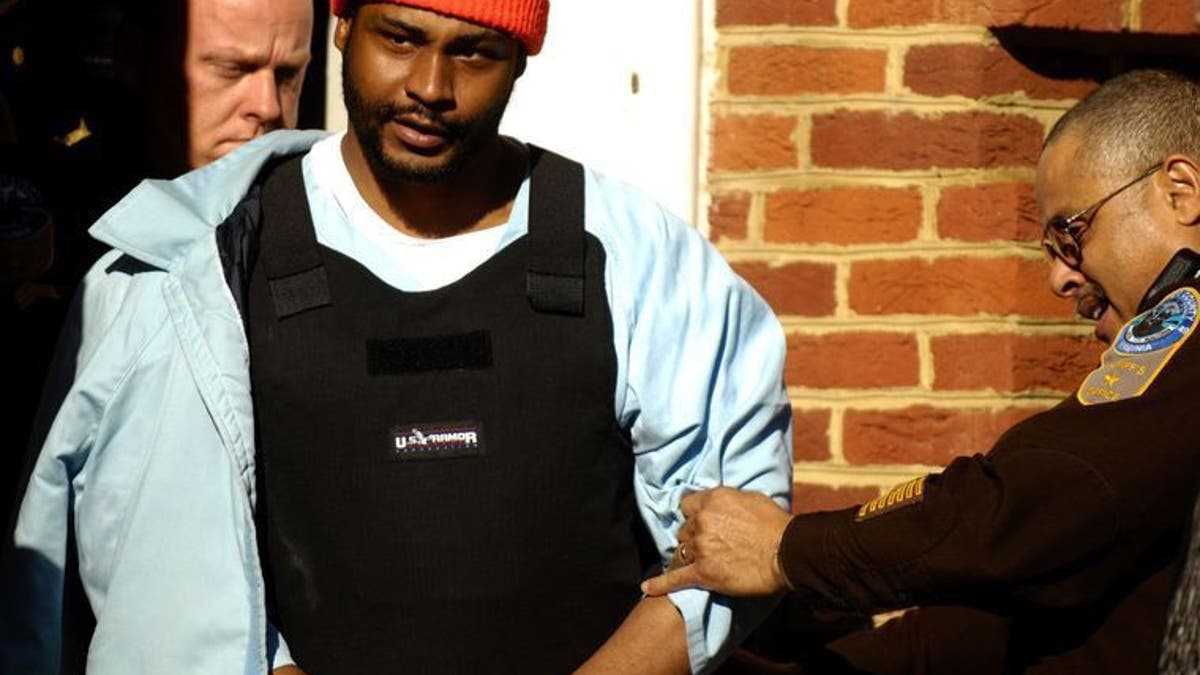
Ricky Gray escorted from the courthouse in 2007. (Mike Morones/The Free Lance-Star via AP, File)
A Virginia inmate asked a federal court Wednesday to block the state's plans to execute him next month with lethal injection drugs from a secret compounding pharmacy, suggesting even a firing squad would be more humane.
CLOSING ARGUMENTS IN CHARLESTON CHURCH SHOOTING TRIAL
Attorneys for Ricky Gray said in a federal complaint that there is a serious risk that Virginia will "chemically torture" the man to death when it uses compounded drugs for his execution scheduled for Jan. 18. Although firing squads aren't permitted under Virginia law, his attorneys argue even that method would be a more humane alternative.
"It is both more humane, quicker, more effective, and would frankly be completely feasible in Virginia," Lisa Fried, an attorney for Gray, said of a firing squad. Gray was convicted of killing a well-known family of four, including two young girls, in Richmond on New Year's Day in 2006.
MILWAUKEE EX-COP CHARGED IN DEADLY SHOOTING
Gray's attorneys plan to ask Gov. Terry McAuliffe to commute his sentence to life in prison, arguing that jurors did not hear enough evidence about Gray's history as a sexual abuse victim and resulting drug use before they chose to sentence him to death, The Virginian-Pilot reported this week.
Virginia's lethal injection protocol calls for the use of a sedative -- pentobarbital or midazolam -- followed by rocuronium bromide to halt breathing, and potassium chloride to stop the heart.
Virginia spent $66,000 to buy enough midazolam and potassium chloride from the compounding pharmacy for two executions, according to documents obtained by The Associated Press. Under a new state law, officials can withhold the pharmacy's identity.
Gray's attorneys said Virginia would be the first state in their knowledge to perform an execution using midazolam or potassium chloride from a compounding pharmacy and the first state to perform an execution using more than one compounded drug.
His attorneys argue that midazolam carries significant risks, pointing to several problematic executions involving the drug. During an Alabama execution last week, death row inmate Ronald Bert Smith Jr. coughed, and his upper body heaved repeatedly for 13 minutes as he was being sedated.
Inmates in other states have challenged the drug's use, arguing that it is a sedative, not an anesthetic, and cannot reliably render a person unconscious. But the U.S. Supreme Court ruled 5-4 last year that Oklahoma inmates didn't prove that midazolam violated the Eighth Amendment's prohibition on cruel and unusual punishment.
The fact that Virginia obtained the drugs from a compounding pharmacy magnifies the risk of the lethal injection being painful and ineffective, Gray's attorneys argue. Compounding pharmacies are not as heavily regulated by the Food and Drug Administration as more conventional pharmacies.
"This method for creating drugs unnecessarily adds enormous risk that the drugs will be ineffective, sub-potent, expired or contaminated," they wrote.
A spokesman for Attorney General Mark Herring declined to comment on Wednesday.
Gray was convicted of killing Bryan and Kathryn Harvey and their 9-year-old and 4-year-old daughters during a home invasion. Bryan was a musician and Kathryn was co-owner of the World of Mirth toy store.
The Harveys were preparing to host friends for a holiday chili dinner when Gray and another man spotted their open front door. They tied the family up in their basement, where they were stabbed and beaten to death before their house was set on fire. Gray claims he doesn't remember the killings because he was high on PCP. The other man was sentenced to life in prison.
Gray's attorneys want the judge to declare that the use of a three-drug protocol with compounded midazolam is unconstitutional. They're also challenging the state's secrecy law that prevents Gray and his attorneys from finding out the identity of the compounding pharmacy.
His lawyers say that Virginia's current alternative -- the electric chair -- also violates the prohibition against cruel and unusual punishment. Utah and Oklahoma are the only states that allow for the firing squad, but it's a backup method in both states, according to the Death Penalty Information Center.
The attorneys wrote in their complaint that Gray was raped repeatedly as a child by his older step brother and physically abused by his father. They say that Gray suffers from post-traumatic stress disorder and has recurring nightmares about the rapes that leave him paralyzed.
The lethal injection process will "mimic this state of paralysis," playing upon Gray's fears and causing him to experience "psychological torture," his attorneys argue.





















